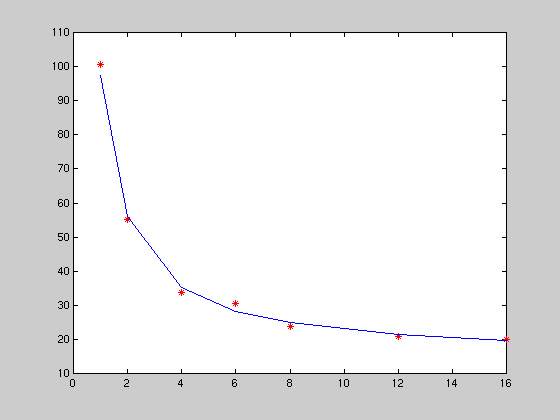- I measured the time it takes to solve a system of 6000 unknowns on our
parallel computer. Measurements where taken for different numbers of
processors, five runs each, since the times vary a little bit. Now we
want to find out how we can describe the data.
- First we load the results from a file:
 load -ascii times.dat
load -ascii times.dat
 times
times
times =
1.0000 93.9700 96.0300 96.7500 121.2200 94.7300
2.0000 51.5800 59.3100 49.7800 55.2400 60.3900
4.0000 31.3100 38.1000 36.5600 31.6100 31.7400
6.0000 29.0100 34.8100 32.9200 27.5900 28.4300
8.0000 23.5300 21.4400 26.3600 27.6700 20.1000
12.0000 21.0600 18.9100 25.4700 18.7300 19.9300
16.0000 18.4400 21.2200 20.1200 20.3900 20.0400
- For convenience, we strip of the first column, containing the number
of cpus:
 ncpus = times(:,1)
ncpus = times(:,1)
ncpus =
1
2
4
6
8
12
16
- And we collect the timing results in another array, with series in columns:
 timings = times(:, 2:end)'
timings = times(:, 2:end)'
timings =
93.9700 51.5800 31.3100 29.0100 23.5300 21.0600 18.4400
96.0300 59.3100 38.1000 34.8100 21.4400 18.9100 21.2200
96.7500 49.7800 36.5600 32.9200 26.3600 25.4700 20.1200
121.2200 55.2400 31.6100 27.5900 27.6700 18.7300 20.3900
94.7300 60.3900 31.7400 28.4300 20.1000 19.9300 20.0400
- Now we compute the mean values of the measurement series:
 means = sum(timings)/size(timings,1)
means = sum(timings)/size(timings,1)
means =
100.5400 55.2600 33.8640 30.5520 23.8200 20.8200 20.0420
- Matlab already has some simple statistical functions, which work on
columns of matrices:
 means = mean(timings)
means = mean(timings)
means =
100.5400 55.2600 33.8640 30.5520 23.8200 20.8200 20.0420
 devs = std(timings)
devs = std(timings)
devs =
11.6113 4.6447 3.2143 3.1382 3.1961 2.7608 1.0101
- We want to fit the results to Amdahls law, which estimates the time T
to run a program on N cpus as
where  is the time for the skalar part, which only runs on one cpu,
and
is the time for the skalar part, which only runs on one cpu,
and  the time for the parallel part that is n times faster on n
cpus.
the time for the parallel part that is n times faster on n
cpus.
- To use the Matlab function polyfit, which fits data to a polynomial,
we transform equation (1) into a polynomial (a linear
function, in fact):
We transform our measured times in the array means accordingly:
 S = ncpus .* means'
S = ncpus .* means'
S =
100.5400
110.5200
135.4560
183.3120
190.5600
249.8400
320.6720
- Now we fit S(n) to a linear function:
 coeff = polyfit(ncpus, S, 1)
coeff = polyfit(ncpus, S, 1)
coeff =
14.4960 82.9423
- These are the coefficients of the linear term and the constant term
respectively, i.e we have
The fitted values are given by
 T_fit = coeff(1) + coeff(2) ./ ncpus
T_fit = coeff(1) + coeff(2) ./ ncpus
T_fit =
97.4383
55.9671
35.2316
28.3197
24.8638
21.4079
19.6799
- Finally we plot the measured values and the fit:
 plot(ncpus, means', 'r*', ncpus, T_fit)
plot(ncpus, means', 'r*', ncpus, T_fit)




Peter Junglas 8.3.2000
